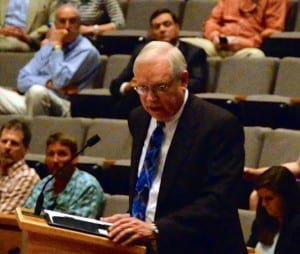Watch Video 13: State Docks Director Jimmy Lyons Argues For Coal Terminal –
See more videos of the hearing here –
“He displayed the serene confidence of a Christian holding four aces.” –
– Mark Twain –
By David Underhill –
MOBILE, Ala. – The director of the Alabama State Port Authority glided smoothly through the turbulent waters of the Mobile city council chamber and docked snugly at the lectern.
Previous speakers at this April 22 hearing on a proposed downtown coal export terminal had peppered the council with data and documents. Some had been emotional and angry, especially ones from neighborhoods near the site. They told of coal dust blowing onto their homes and into their lungs from an existing coal terminal run by the port authority. They feared more of the same from the mountains of coal that would rise at the new dock, a project of Walter Energy company.
Some had used the projection equipment to emphasize their arguments. Some drew applause and shouts of support from the crowd of hundreds, and the council president repeatedly gaveled these expressive citizens down or threatened to have the police haul them out.
But port director Jimmy Lyons exuded the affable ease of a seasoned CEO accustomed to cozy connections with politicians. He bantered with the council about not needing the projector, saying he would rather have just the blank white screen rising above them to indicate the absence of coal dust as a genuine issue.
With this flippant intro he dismissed the main complaints of the opponents. Suppressive equipment at the state’s coal dock, he said, had greatly reduced its dust emissions. And this new private facility would have the finest current technology that shrinks them almost to zero.
Having dispatched dust, he recited some of the standard praises of the port as the reason for the city’s existence, and coal as the chief cargo, and the waterfront as the heart of the region’s economy. This gave him confidence that the council would do the right thing. Then he turned and sailed majestically away through the clamorous throng.
Terminal Hocus-Pocus
The next day’s local paper revealed the source of Lyons’ aplomb. An article about the contentious project cited him as saying if the city council exercised its zoning authority to prohibit the coal terminal, the port authority would be interested in buying that waterfront parcel. He coyly declined to say whether this interest had advanced to specific discussions with Walter Energy about acquiring the land. And a spokesman for the company turned too shy to comment about their mutual romancing.
Lyons also wouldn’t quite say what use the port authority intended if its interest blossomed into a purchase. But ownership of the tract would allow the authority and the company to indulge in temptation together.
Because the port authority is a state agency the city cannot apply its zoning or other restrictions to property owned by the authority. If the authority buys that land from the company and then leases it back to the company, the city council can pitch whatever size fit it would enjoy having but the coal terminal and its dusty black mountains would rise on the waterfront anyway.
This means director Lyons was performing in a charade when he spoke at the hearing about the terminal. Whether any council members were also actors in this pretense isn’t clear, but Lyons surely knew of exploratory approaches to Walter Energy that could lead to a lease-back switcheroo. And he posed as a supplicant asking the council to give the coal dock its blessing, while knowing this project could proceed regardless.
So of course he oozed confidence at that hearing. It wasn’t a public meeting to decide a weighty issue. It was mere ceremony.
Not Citizens, Extras
And the citizens who had diligently researched the issues and crafted their remarks for the council were also performing an assigned role, although they didn’t know it. They provided the duped appearance of the public having a real voice in a process with the outcome already scripted.
Even this supporting role was a rerun. Years ago port authority director Lyons played the leading part in a very similar drama. Then the issue was whether to transform a large empty tract into a waterfront park. For a city to have as many miles of river and bay shore as Mobile does with so little of it available to regular folks isn’t just odd — it’s insulting.
The few grudgingly granted water accesses are so unattractive, uninviting and cramped that they resemble in spirit a prison exercise yard. The prospect of a pleasant, spacious park drew lots of people to meetings where they earnestly delved into planning. But they were not told by Lyons that a choice stretch of the potential park’s shoreline was bait in negotiations with industries coveting it for docks. And one day the maps for the meetings suddenly showed that sector simply missing from the park’s design. The remaining stub is now a forlorn little park with its only shoreline a swamp.
Lyons and his cohorts then could have deflected dismay from the start by telling the hopeful folks that other suitors were seeking dock space where the park would be. And this week he could have frankly told the crowd at the coal terminal hearing that legal land maneuvers can get this facility built even if the city council votes against it.
But such frank talk to the citizens might spook the secretive private promoters of mega projects. Repeatedly when rumors circulate about some big economic prospect, the public officials involved and chamber of commerce leaders will caution against anybody revealing what the developers wish to be kept secret. Sometimes the locals entangled in these negotiations must sign confidentiality agreements.
This puts even elected officials in the position of having to hide what they know from the people they are supposed to be representing. Some may enjoy dabbling in these insider intrigues. Others may reluctantly accept them as necessary.
Either way, the public is omitted from an effective part in decisions while invited to take occasional ritual roles that look like democratic participation.
But the director of the port authority is an actual participant. So are those who command the major enterprises that can decide to grant or withhold their resources from this city or that, this nation or that.
In these circumstances it’s fitting that Mobile has lately become—thanks to its cheap labor and semi-exotic locale — a bit of a B-movie Hollywood on the Gulf. Low-budget film crews and fading stars are fairly common sights in the area. And in the city council chamber this week the citizens packed into the coal terminal hearing were extras, along with the council, in a production starring visibly the director of the port authority and invisibly the chief investors of Walter Energy.














